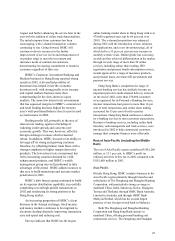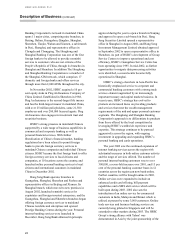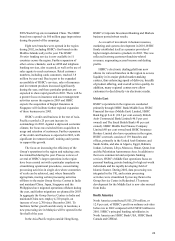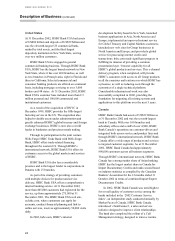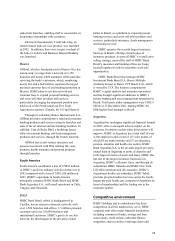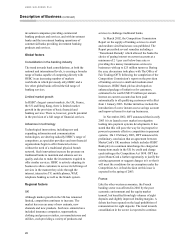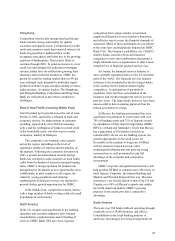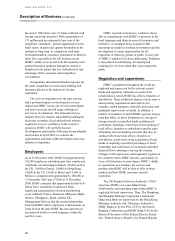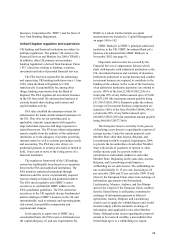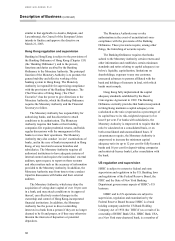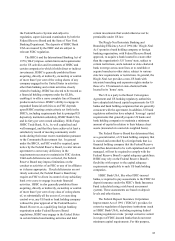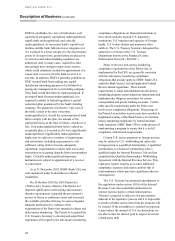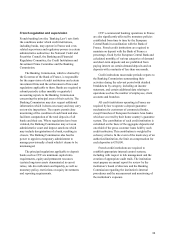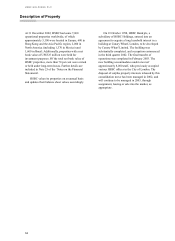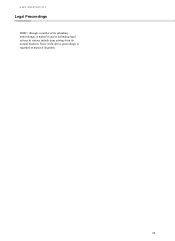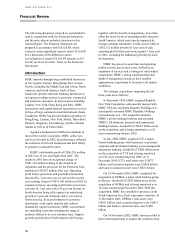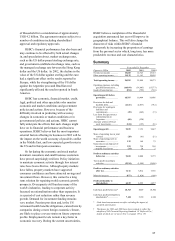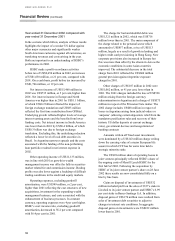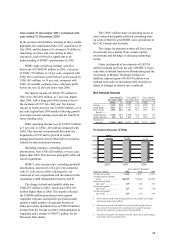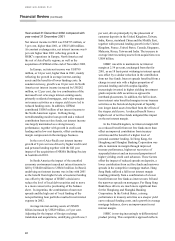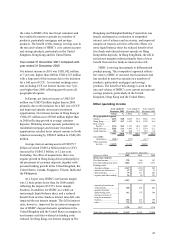HSBC 2002 Annual Report Download - page 33
Download and view the complete annual report
Please find page 33 of the 2002 HSBC annual report below. You can navigate through the pages in the report by either clicking on the pages listed below, or by using the keyword search tool below to find specific information within the annual report.31
the Federal Reserve System and subject to
regulation, supervision and examination by both the
Federal Reserve Board and the State of New York
Banking Department. The deposits of HSBC Bank
USA are insured by the FDIC and are subject to
relevant FDIC regulation.
The BHCA and the International Banking Act of
1978 (‘IBA’ ) impose certain limits and requirements
on the US activities and investments of HSBC and
certain companies in which it holds direct or indirect
investments. HSBC is generally prohibited from
acquiring, directly or indirectly, ownership or control
of more than 5 per cent of the voting shares of any
company engaged in the United States in activities
other than banking and certain activities closely
related to banking. HSBC has elected to be treated as
a financial holding company under the GLBA,
enabling it to offer a more complete line of financial
products and services. HSBC’s ability to engage in
expanded financial activities as an FHC depends
upon HSBC meeting certain criteria set forth in the
BHCA, including requirements that its principal US
depository institution subsidiary, HSBC Bank USA,
and its forty per cent owned subsidiary, Wells Fargo
HSBC Trade Bank, N.A., be well capitalized and
well managed, and that they have achieved at least a
satisfactory record of meeting community credit
needs during their most recent examination pursuant
to the Community Reinvestment Act. In general
under the BHCA, an FHC would be required, upon
notice by the Federal Reserve Board, to enter into an
agreement to correct any deficiency in the
requirements necessary to maintain its FHC election.
Until such deficiencies are corrected, the Federal
Reserve Board may impose limitations on the
conduct or activities of an FHC or any of its affiliates
as it deems appropriate. If such deficiencies are not
timely corrected, the Federal Reserve Board may
require an FHC to divest its control of any subsidiary
bank or to cease to engage in certain financial
activities. HSBC is also generally prohibited from
acquiring, directly or indirectly, ownership or control
of more than 5 per cent of any class of voting shares
of, or substantially all the assets of, or exercising
control over, any US bank or bank holding company
without the prior approval of the Federal Reserve
Board. However, as a qualifying foreign banking
organisation under Federal Reserve Board
regulations, HSBC may engage in the United States
in certain limited non-banking activities and hold
certain investments that would otherwise not be
permissible under US law.
The Riegle-Neal Interstate Banking and
Branching Efficiency Act of 1994 (the ‘Riegle-Neal
Act’ ) permits a bank holding company or foreign
banking organisation, with Federal Reserve Board
approval, to acquire a bank located in a state other
than the organisation’s US ‘home’ state, subject to
certain restrictions, and a national or state-chartered
bank to merge across state lines or to establish or
acquire branches in other states, subject to various
state law requirements or restrictions. In general, the
Riegle-Neal Act provides a non-US bank with
interstate branching and expansion rights similar to
those of a US national or state-chartered bank
located in its ‘home’ state.
The US is a party to the Basel Convergence
Agreement and US banking regulatory authorities
have adopted risk-based capital requirements for US
banks and bank holding companies that are generally
consistent with the agreement. In addition, US bank
regulatory authorities have adopted ‘leverage’ capital
requirements that generally require US banks and
bank holding companies to maintain a minimum
amount of capital in relation to their balance sheet
assets (measured on a non-risk-weighted basis).
The Federal Reserve Board has determined that,
as a general matter, a US bank holding company that
is owned and controlled by a foreign bank that is a
financial holding company that the Federal Reserve
Board has determined to be well capitalised and well
managed, will not be required to comply with the
Federal Reserve Board’s capital adequacy guidelines.
HSBC may rely on the Federal Reserve Board’ s
flexibility with respect to the capital adequacy
requirements applicable to such US bank holding
companies.
HSBC Bank USA, like other FDIC-insured
banks, is required to pay assessments to the FDIC for
deposit insurance under the FDIC’s Bank Insurance
Fund (calculated using a risk-based assessment
system). These assessments are based on deposit
levels and other factors.
The Federal Deposit Insurance Corporation
Improvement Act of 1991 (‘FDICIA’ ) provides for
extensive regulation of depository institutions (such
as HSBC Bank USA), including requiring federal
banking regulators to take ‘prompt corrective action’
in respect of FDIC-insured banks that do not meet
minimum capital requirements. For this purpose,


